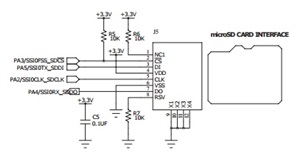I want to interface SD card with my EK-TM4C123GXL Tiva launchpad. I went through many of the posts on the same, and many of them suggested to start from the Tivaware example of SD card interfacing with the DK-TM4C123GXL launchpad. Taking help from that example, I made a basic code to test of the SD card is present or not as follows:
#include <stdint.h>
#include <stdbool.h>
#include <string.h>
#include "inc/hw_memmap.h"
#include "driverlib/fpu.h"
#include "driverlib/gpio.h"
#include "driverlib/interrupt.h"
#include "driverlib/pin_map.h"
#include "driverlib/rom.h"
#include "driverlib/sysctl.h"
#include "driverlib/systick.h"
#include "driverlib/uart.h"
#include "utils/uartstdio.h"
#include "fatfs/src/ff.h"
#include "fatfs/src/diskio.h"
#include "fatfs/port/mmc-dk-tm4c123g.c"
static FATFS g_sFatFs;
static FIL g_sFileObject;
void
SysTickHandler(void)
{
disk_timerproc();
}
void
ConfigureUART(void)
{
ROM_SysCtlPeripheralEnable(SYSCTL_PERIPH_GPIOA);
ROM_SysCtlPeripheralEnable(SYSCTL_PERIPH_UART0);
ROM_GPIOPinConfigure(GPIO_PA0_U0RX);
ROM_GPIOPinConfigure(GPIO_PA1_U0TX);
ROM_GPIOPinTypeUART(GPIO_PORTA_BASE, GPIO_PIN_0 | GPIO_PIN_1);
UARTClockSourceSet(UART0_BASE, UART_CLOCK_PIOSC);
UARTStdioConfig(0, 9600, 16000000);
UARTStdioConfig(0, 9600, 16000000);
}
int main(void)
{
int nStatus;
FRESULT iFResult;
ROM_FPULazyStackingEnable();
ROM_SysCtlClockSet(SYSCTL_SYSDIV_4 | SYSCTL_USE_PLL | SYSCTL_OSC_MAIN |
SYSCTL_XTAL_16MHZ);
ROM_SysCtlPeripheralEnable(SYSCTL_PERIPH_SSI0);
power_on();
ROM_SysTickPeriodSet(ROM_SysCtlClockGet() / 100);
ROM_SysTickEnable();
ROM_SysTickIntEnable();
ROM_IntMasterEnable();
ConfigureUART();
UARTprintf("\n\nSD Card Example Program\n");
iFResult = f_mount(0, &g_sFatFs);
if(iFResult == FR_INVALID_DRIVE)
{
UARTprintf("f_mount error\n");
return(1);
}
else if(iFResult == FR_OK)
{
UARTprintf("SD card found\n");
return(1);
}
else
{
UARTprintf("nothing\n");
return(1);
}
}
While building, it gives me the following errors:
Description Resource Path Location Type
#10056 symbol "disk_initialize" redefined: first defined in "./main_1.obj"; redefined in "./third_party/fatfs/port/mmc-dk-tm4c123g.obj" sd_card C/C++ Problem
and similar errors for disk_read, disk_ioctl, etc.
I am unable to understand why there the multiple inititalizations are happening in spite of making sure that there is only one instance. I am using CCSv6.
Can anyone help me with this? I am stuck on SD card interfacing since a long time. Please guide me through this.
Thank you.


